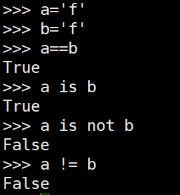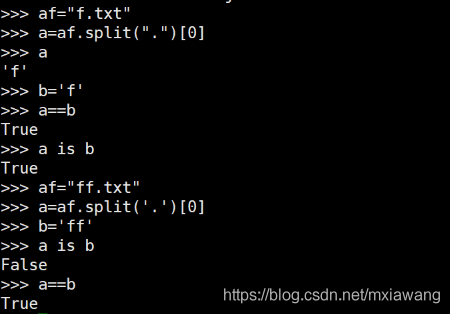今天就跟大家聊聊有关使用python怎么比较字符串是否一样,可能很多人都不太了解,为了让大家更加了解,小编给大家总结了以下内容,希望大家根据这篇文章可以有所收获。
示例

如果两个字符串末尾有其他符号,比如回车‘\n',print的时候无法发现的,所以需要strip:
a=a.strip()
b=b.strip()
if a==b:
print "True"这是因为两个字符串来自不同的内存块,内存地址不一样
id() 函数用于获取对象的内存地址。
(ob1 is ob2) 等价于 (id(ob1) == id(ob2)) id函数可以获得对象的内存地址,如果两个对象的内存地址是一样的,那么这两个对象肯定是一个对象。和is是等价的.

原理比较复杂,如下:
In [1]: def bar(self, x):
...: return self.x + y
...:
In [2]: class Foo(object):
...: x = 9
...: def __init__(self ,x):
...: self.x = x
...: bar = bar
...:
In [3]: foo = Foo(5)
In [4]: foo.bar is Foo.bar
Out[4]: False
In [5]: id(foo.bar) == id(Foo.bar)
Out[5]: True真实情况是当执行.操作符的时候,实际是生成了一个proxy对象,foo.bar is Foo.bar的时候,两个对象顺序生成,放在栈里相比较,由于地址不同肯定是False,但是id(foo.bar) ==id(Foo.bar)的时候就不同了,首先生成foo.bar,然后计算foo.bar的地址,计算完之后foo.bar的地址之后,就没有任何对象指向foo.bar了,所以foo.bar对象就会被释放。然后生成Foo.bar对象,由于foo.bar和Foo.bar所占用的内存大小是一样的,所以又恰好重用了原先foo.bar的内存地址,所以id(foo.bar) == id(Foo.bar)的结果是True。
下面内容由邮件Leo Jay大牛提供,他解释的更加通透。
用id(expression a) == id(expression b)来判断两个表达式的结果是不是同一个对象的想法是有问题的。
foo.bar 这种形式叫 attribute reference [1],它是表达式的一种。foo是一个instance object,bar是一个方法,这个时候表达式foo.bar返回的结果叫method object [2]。
根据文档:
When an instance attribute is referenced that isn't a data attribute, its class is searched. If the name denotes a valid class attribute that is a function object, a method object is created by packing (pointers to) the instance object and the function object just found together in an abstract object: this is the method object.
foo.bar本身并不是简单的名字,而是表达式的计算结果,是一个 method object,在id(foo.bar)这样的表达式里,method object只是一个临时的中间变量而已,对临时的中间变量做id是没有意义的。
一个更明显的例子是,
print id(foo.bar) == id(foo.__init__) 输出的结果也是True看 id 的文档[3]:
Return the “identity” of an object. This is an integer (or long integer) which is guaranteed to be unique and constant for this object during its lifetime. Two objects with non-overlapping lifetimes may have the same id() value. CPython implementation detail: This is the address of the object in memory.
只有你能保证对象不会被销毁的前提下,你才能用 id 来比较两个对象。所以,如果你非要比的话,得这样写:
fb = foo.bar
Fb = Foo.bar
print id(fb) == id(Fb)即把两个表达式的结果绑定到名字上,再来比是不是同一个对象,你才能得到正确的结果。
is表达式 [4] 也是一样的,你现在得到了正确的结果,完全是因为 CPython 现在的实现细节决定的。
现在的is的实现,是左右两边的对象都计算出来,然后再比较这两个对象的地址是否一样。
万一哪天改成了,先算左边,保存地址,把左边释放掉,再算右边,再比较的话,你的is的结果可能就错了。
官方文档里也提到了这个问题 [5]。
我认为正确的方法也是像id那样,先把左右两边都计算下来,并显式绑定到各自的名字上,然后再用is判断。
cmp() 函数则是相当于 <,==,> 但是在 Python3 中,cmp() 函数被移除了,所以我以后还是避免少用这个函数。
#-*-conding:utf-8-*-
i='新闻';
m=input();
if i==m:
print('yes');
else:
print('no');
input();if second_company_name == u'中外运长航' or second_company_name == u'长航集团':
print(u'忽略中外运长航和长航集团的子公司')
continue在 if 判断语句中非常有用呐!
#!/usr/bin/python
# Filename: if.py
number = 23
guess = int(raw_input('Enter an integer : '))
if guess == number:
print 'Congratulations, you guessed it.' # New block starts here
print "(but you do not win any prizes!)" # New block ends here
elif guess < number:
print 'No, it is a little higher than that' # Another block
# You can do whatever you want in a block ...
else:
print 'No, it is a little lower than that'
# you must have guess > number to reach here
print 'Done'
# This last statement is always executed, after the if statement is executed```
## strip 去掉字符串其他符号
str1 = str1.strip() #去掉字符串中其他符号包括换行符等等
str2 = str2.strip()
if str2 == str1:
... #自己的代码
## == 与 is的区别python中,使用==来比较两个**对象的值**是否相等,而java 则使用== 比较两个**对象**是否是同一对象
譬如,java中比较字符串,一般使用equal 方法,来比较两个对象的值是否相等,而不使用==
相比较的,python 使用**is** 来比较两个对象是否是同一对象。
is 用来判断是否是同一个对象,is 是种很特殊的语法,你在其它的语言应该不会见到这样的用法。
官方文档解释:
```python
The operators ``is`` and ``is not`` test for object identity: ``x is
y`` is true if and only if *x* and *y* are the same object. ``x is
not y`` yields the inverse truth value.
cmp(...)
cmp(x, y) -> integer
Return negative if x<y, zero if x==y, positive if x>y.>>> a='abc'
>>> b='abc'
>>> a is b
True
>>> id(a) == id(b)
True
>>>
>```
(Java 中直接赋值的字符串也可用 == 来判断,但是使用 new 实例化的对象则需要使用equals(String s) 来判断)
## 判断数字相等不要用 is 操作符
```python
>>> a = 256
>>> b = 256
>>> id(a)
9987148
>>> id(b)
9987148
>>> a = 257
>>> b = 257
>>> id(a)
11662816
>>> id(b)
11662828为什么两次 is 返回的是不同结果?不是应该都是 true 吗?
因为 string pooling (或叫intern)。 is 相等代表两个对象的 id 相同(从底层来看的话,可以看作引用同一块内存区域)。 至于为什么 “ABC” 被 intern 了而 “a bc” 没有,这是 Python 解析器实现决定的,可能会变。
== 用来判断两个对象的值是否相等(跟 Java 不同,Java 中 == 用来判断是否是同一个对象)。
看完上述内容,你们对使用python怎么比较字符串是否一样有进一步的了解吗?如果还想了解更多知识或者相关内容,请关注亿速云行业资讯频道,感谢大家的支持。
亿速云「云服务器」,即开即用、新一代英特尔至强铂金CPU、三副本存储NVMe SSD云盘,价格低至29元/月。点击查看>>
免责声明:本站发布的内容(图片、视频和文字)以原创、转载和分享为主,文章观点不代表本网站立场,如果涉及侵权请联系站长邮箱:is@yisu.com进行举报,并提供相关证据,一经查实,将立刻删除涉嫌侵权内容。